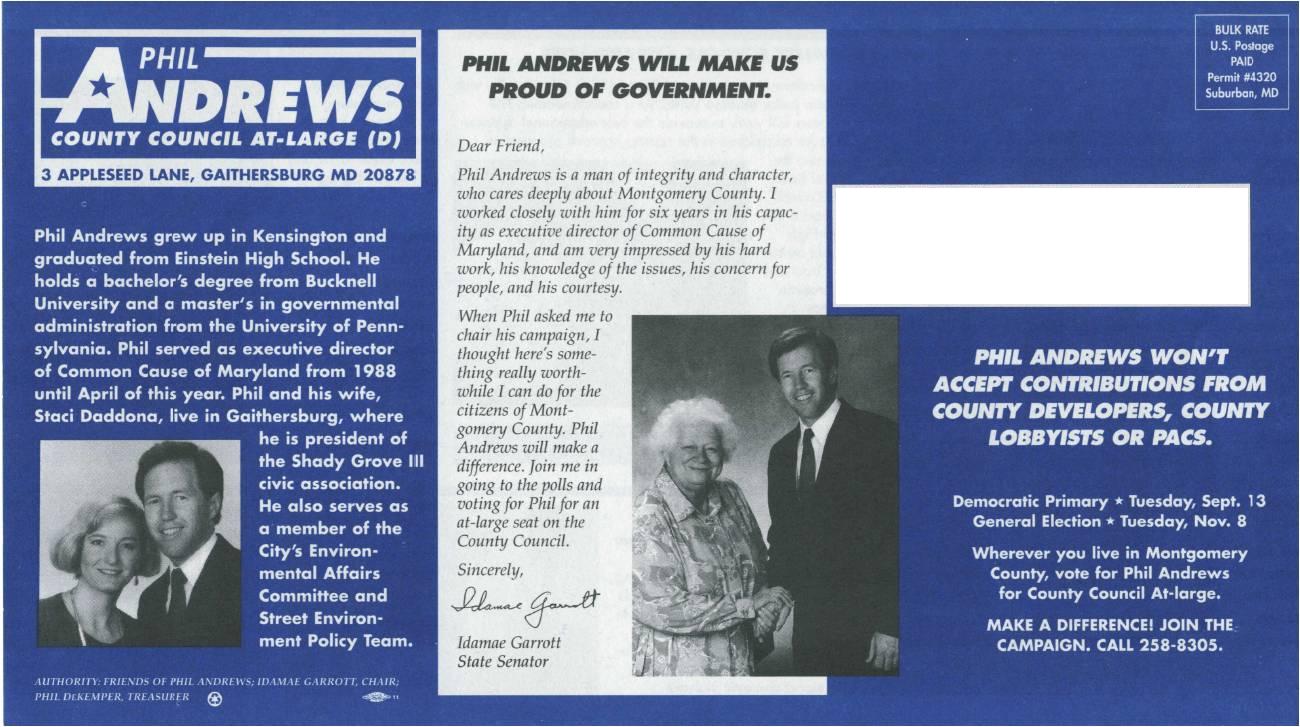By Adam Pagnucco.
Of all the elected officials I have met in more than 16 years of public writing, the one I respect the most may be former Council Member Phil Andrews. That does not stem from matters of policy but rather his conduct as a public official. He was always fair. He treated everyone with respect. He took nothing personally. He was as honest as a politician could ever be while still getting elected. (This is really hard because voters often punish politicians for telling the truth.) And he understood the enormous responsibility of spending the public’s money. More than any other elected official, Phil understood that it was OUR money, not his money or the council’s money.

A mailer from Phil’s 1994 campaign for council at-large. He lost this race but defeated an incumbent to be elected in District 3 four years later.
In December 2009, Phil was leaving the position of council president. There was a great deal of drama that day as Council Member Nancy Floreen used a new council majority to claim the position of president away from Vice-President Roger Berliner, an unusual and disruptive event for the council. But aside from that drama (which was fun to write about at the time), what I remember most is Phil’s concluding remarks as council president. They remain the best advice I have ever heard for public officials, whether on the council or anywhere else. For the benefit of the new council and the public, I reprint an excerpt from them below.
*****
Since our county’s—and our country’s—bicentennial 33 years ago, the County’s motto has been “Gardez bien.” It means to “guard well.”
The motto is inscribed on the County seal that hangs behind this dais. It is an ever-present reminder that to guard well is the County Council’s primary responsibility.
It is the Council’s responsibility: To guard well the public interest, whatever that may be in a situation, and against whoever would have the Council do something contrary to the public interest.
It is the Council’s responsibility: To guard well the public treasury from unwarranted claims.
It is the Council’s responsibility: To guard well those who must have the help of government to live a decent life.
It is the Council’s responsibility: To guard well the history of the County. AND
It is the Council’s responsibility: To guard well the reputation of the County for integrity in government.
It is our sacred obligation – as it is of all elected officials — to put the public interest first. For if the decisions of this Council — or of any legislative body — are simply a reflection of the power of temporary, powerful interests, the Burkean ideal of representation is lost.
Here is what English statesman Edmund Burke said for the ages in a speech to the Electors of Bristol on Nov. 3, 1774. Burke spoke about representation:
“Certainly, gentleman, it ought to be the happiness and glory of a representative to live in the strictest union, the closest correspondence, and the most unreserved communication with his constituents. Their wishes ought to have great weight with him, their opinion, high respect, their business, unremitted attention. It is his duty to sacrifice his repose, his pleasures, his satisfactions, to theirs; and above all, ever, and in all cases, to prefer their interest to his own. But his unbiased opinion, his mature judgment, his enlightened conscience, he ought not to sacrifice to you, to any man, or to any set of men living. These he does not derive from your pleasure; no, nor from the law and the constitution. They are a trust from Providence, for the abuse of which he is deeply answerable. YOUR REPRESENTATIVE OWES YOU, NOT HIS INDUSTRY ONLY, BUT HIS JUDGMENT; AND HE BETRAYS, INSTEAD OF SERVING YOU, IF HE SACRIFICES IT TO YOUR OPINION.”
Now, how does Burke’s clarion call apply to the County Council? It means that the Council needs to listen to everyone, to consider all interests and then apply its best judgment on each and every matter that comes before it. Nothing less than this is acceptable; nothing more than this is required.
When individuals and groups come to the County Council to ask for funds or to ask for legislation or for a resolution or for a zoning text amendment or for a master plan change or for something else, the Council should ask the following questions:
1) Is it in the public interest?
2) Is it affordable?
3) Is it sustainable?
4) Is it the next best use of scarce tax dollars?
5) Is it necessary for the County to fund it?
Following this framework is much easier said than done since constituencies that would have the Council spend taxpayers’ funds are almost always better organized than the general public. Most public hearings on the budget are prime examples.
That’s why it is just as important for the Council to think about who is not in the room, who is not at the table, as who is. We have to look out for and represent their interests as well.
So who is typically not seated at the table of government? Who do not have lobbyists to represent them?
Very few people who are poor testify before the County Council. Very few people who work two or three jobs so they are not poor testify before the County Council. Very few people with severe disabilities testify before the Council. Very few young people testify before the County Council. Very few new immigrants testify before the Council. And very few people who are primarily concerned about the cost of government testify before the Council. We need to remember all of these people as we make decisions that affect them.
